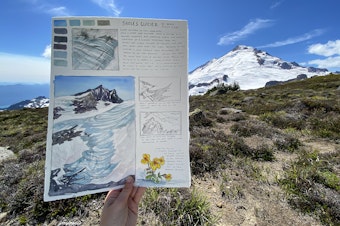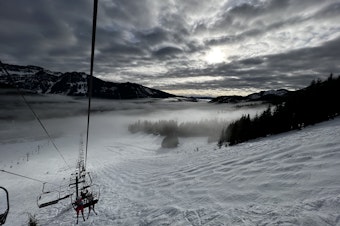Alec Cowan
Producer, Soundside
About
Alec Cowan is a producer for Soundside. His interests have brought many eclectic stories to the program, and his segments gravitate toward history, technology, arts and culture, and the environment. Proud to be KUOW's unofficial "boat guy."
Prior to joining Soundside, Alec wore many hats at KUOW. He was a producer for The Record with Bill Radke and Primed seasons two and three . He also reported an episode of SoundQs detailing how prohibition forever changed Seattle policing and assisted with reporting a breakthrough cold case solved with the use of genetic genealogy.
Before joining KUOW Alec worked in NPR's Story Lab, where he helped pilot the Louder Than a Riot podcast, about hip-hop and mass incarceration, and assisted in producing a story on volunteerism in Iraq for Rough Translation. Originally from Grand Junction, Colorado, his roots in the Northwest begin in Eugene, where he studied English and philosophy at the University of Oregon and worked as a news reporter for NPR member station KLCC. He is likely neglecting his saxophone, growing book collection, and expanding personal project list in favor of boosting his online Xbox ranking.
Location: Seattle
Languages Spoken: English
Pronouns: he/him/his
Podcasts
Stories
-

Sound it out: messages from listeners
At its core, Soundside is about connecting with our listeners and bringing you stories you care about and that impact those of us living here in the Pacific Northwest. Each week we ask for your thoughts about our stories -- where they've succeeded and where they can improve. Here's what you told us.
-

Technology
A tech dystopia in Puget Sound: Vauhini Vara's "The Immortal King Rao"
The fictional tech company at the center of the new book, “The Immortal King Rao,” is called “Coconut.” It’s a rough amalgamation of Apple and Microsoft of the 1980s and 1990s, driving a personal computer revolution, and later it morphs into a Google, Amazon and Facebook avatar in the way it gobbles up peoples’ data and monetizes human interaction.
-

Environment
These artists climb mountains to help document climate change
In order to study our local glaciers, researchers hike back into some of the most remote outreaches of our wilderness. But they're rarely going alone. Aside from research teams, these expeditions frequently include artists, and through painting, sketching and other mediums, these artists are working with scientists to communicate science in a way that isn't reliant on numbers or heady scientific explanations.
-

Arts & Life
Hear it again: Could this be the end of the ski bum?
There was a silver lining to the soggy, cold May we just had... It means local skiers can keep bombing down the mountain an extra couple weeks. Crystal Mountain has extended its season through June 12th.
-

Government
Changing the channel — San Juan locals propose new name for waterway
If you take the ferry from Anacortes to the San Juan Islands, you pass through the Harney Channel. But the history behind the channel's namesake -- William S. Harney -- holds a gruesome legacy. After discovering this history, two San Juan locals submitted a proposal to change the name to the Cayou Channel, after famed local Henry Cayou.
-

Environment
Puget Sound is full of old tires... on purpose?
Decades ago, states began putting bundles of tires on the sea floor as "artificial reefs." Their aim was to build new habitats for local marine life. Today, researchers have found those tires are toxic. So who's job is it to pull these tens of thousands of tires back up?
-

Environment
Our local seaweed is disappearing. Could farming help conserve it?
In 2016, Washington's first commercial seaweed farm broke onto the scene. It was the result of unprecedented collaboration between local tribes, state agencies, marine researchers, and local conservationists. As climate change begins to threaten Puget Sound today, a robust seaweed industry in the region could help combat its most negative effects.
-

Environment
Washington's glaciers are disappearing. Can anything be done to save them?
A recent report is showing the Olympic peninsula could lose 80% of its glaciers in the next 50 years. Forecasts for our Cascade glaciers show a similar grim trajectory. What happens when our most distinguished
-

Health
How public health officials are navigating the current pandemic moment
The United States is approaching one million deaths from the COVID-19 virus, a figure far and above the rest of the world. As pandemic restrictions are lifting, both at the state level and federally, how are public health officials navigating tracking and guidance?
-

Arts & Life
‘I was blindfolded. No one spoke a word.’ Seattle-area women talk about abortion before Roe
Did you have an illegal abortion before 1973, when the Supreme Court decided Roe v. Wade? Soundside, KUOW’s noon show, asked for your stories, and a dozen of you left voicemails, sharing first-hand experiences. Transcriptions of those voicemails are below, and have been edited for clarity.
